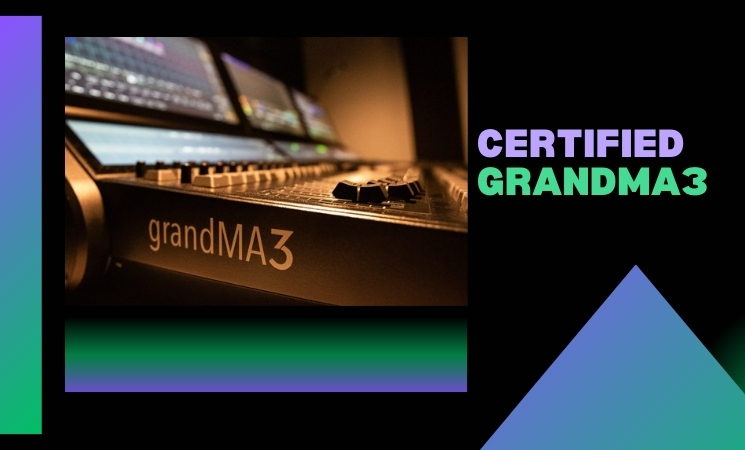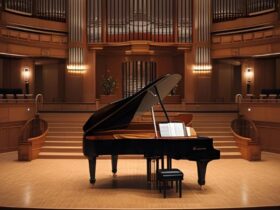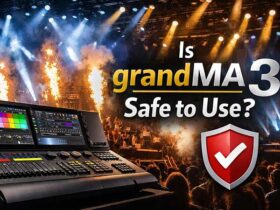The world of professional lighting is moving fast, and grandMA3 has become the go-to console for many production companies. But if you’re aiming to build a career in live events or touring productions, a common question comes up: Do production companies require certification in grandMA3?
The short answer is: not always, but certification definitely helps.

Do I Have to Get Certified in grandMA3?
The short answer is no, you do not have to get certified in grandMA3 to work with the console professionally.
There is no legal requirement, industry wide license, or mandatory credential needed to operate grandMA3 at events, concerts, theaters, or corporate productions. Unlike regulated professions, lighting programmers are not required to hold an official certification to be hired.
What matters far more is whether you can confidently program, troubleshoot, and run a show in real-world conditions.
Why grandMA3 Matters in the Industry?
MA Lighting’s grandMA3 is one of the most powerful lighting control platforms in the world. It’s used in stadium tours, broadcast studios, corporate events, and large theater productions.
That makes knowledge of the system highly valuable. But does that knowledge have to come with a certificate?
Certification vs. Experience
Production companies rarely make certification a hard requirement. Instead, they care about whether you can program quickly, run a show smoothly, and troubleshoot under pressure.
- Certification helps: Having an official MA Lighting training certificate looks good on your CV. It proves you’ve learned the platform in a structured way and understand its advanced features.
- Experience matters more: Many smaller companies will hire you if you can demonstrate skills, regardless of paperwork. A strong portfolio—videos of your shows, references from previous gigs—often carries more weight than a certificate.
In short: certification is a bonus, not a barrier.
When Certification Can Give You an Edge?
There are scenarios where production companies prefer certified operators:
- Large touring productions where multiple consoles run in networked sessions.
- Corporate shows and broadcasts that rely heavily on timecode and complex cue lists.
- High-end rental houses that want assurance their freelancers meet industry standards.
GrandMA3 Adoption Trend
| Year | GrandMA2 Usage | GrandMA3 Usage | Notes |
| 2019 | Very high | Low | Early launch |
| 2021 | High | Growing | MA3 gaining traction |
| 2023 | Medium | Strong | More tours switching |
| 2025 | Niche use | Dominant | MA3 is industry standard |
Do More People Use grandMA3 Now?
Yes, more people are moving to grandMA3 as the industry standard. When it first launched, many programmers stuck to grandMA2 because of familiarity. But adoption has grown rapidly:
- Bigger productions now run entirely on grandMA3 hardware.
- Theater and concert tours are switching over thanks to advanced features and network reliability.
- OnPC setups make it easier for freelancers to learn and practice at home.
While some users still love grandMA2 for its maturity, the trend is clear: grandMA3 is taking over. If you’re just starting your career, focusing on MA3 is the smarter long-term move.
Fixture Libraries and 3D Models
Working on grandMA3 isn’t only about running cues—it’s also about visualization. Many programmers rely on 3D models and GDTF fixture profiles to pre-program shows before stepping into the venue.
- The acme pixel line ip grandma3 3d model is a good example of a modern LED strip that benefits from accurate 3D visualization inside MA3.
- Lasers are also becoming more common in productions, and integrating fixtures like the x laser skywriter grandma3 with proper profiles ensures realistic previews during pre-viz sessions.
These tools help designers present concepts to clients and save valuable setup time during rehearsals.
Final Thoughts
So, do production companies require certification in grandMA3? Not always. But certification can strengthen your resume, build client confidence, and make you stand out—especially for high-end gigs. The good thing is grandma3 is safe to use when it’s set up and operated correctly.org
What matters most is proven skill. If you can show you’re comfortable programming, visualizing, and running shows on grandMA3, companies will want you on their team.
















Leave a Reply